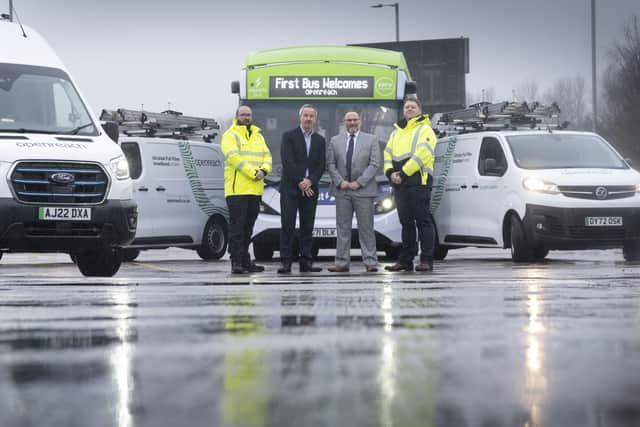First Bus and Openreach bring on board 'milestone' tie-up to share EV charging facilities
A major player in Scotland’s transport sector has announced what it says is its biggest electric vehicle partnership to date with the UK’s largest broadband network provider, helping drive more eco-friendly journeys in Glasgow, Aberdeen, and beyond via shared charging facilities – and it is now seeking to get more firms on board.
First Bus has revved up the “milestone collaboration” with Openreach, with the latter joining parcel delivery specialist DPD and Police Scotland as early movers “plugging into the innovative shared infrastructure initiative”.
Advertisement
Hide AdAdvertisement
Hide AdThe initial phase of the partnership will see up to 30 Openreach electric vehicles charging at First Bus depots in Glasgow and Aberdeen while buses are in service, enabling the broadband network provider’s engineers to “cover more ground, reduce their environmental impact, and dedicate more time to the needs of their customers”.


First Bus explains that it is keen to harness its electric vehicle infrastructure to help local communities and businesses reach their own environmental aspirations as it looks to operate a zero-emission bus fleet by 2035. The bus firm adds that it is interested in hearing from companies looking to benefit from this partnership across its Aberdeen, Scotstoun, and Caledonia sites. The latter, located on Glasgow's southside, has 160 rapid-charging points.
Graeme Macfarlan, commercial director for First Bus Scotland, cheered the new tie-up and its eco-friendly mission. He added: “As businesses across Scotland embark on the journey to electrify their fleets, it simply isn’t practical for every business to build its own charging infrastructure. We understand these challenges, and are providing a smart solution that benefits the community and optimises space. At First Bus, we are committed to delivering cleaner, greener journeys across our UK networks, not only through our own fleet – but by working in partnership with businesses such as Openreach.”
First Bus is part of Aberdeen-headquartered, FTSE 250 transport giant FirstGroup, which recently unveiled a “pioneering alliance” with Japanese giant Hitachi to lease up to 1,000 electric bus batteries as part of its green fleet expansion plans.
Openreach says its fleet currently includes more than 3,000 electric vehicles, and it is aiming to convert all its diesel fleet to zero emissions by 2031, while it also notes that it is a founding member of EV100, a global initiative dedicated to accelerating the transition to electric vehicles this decade.
Robert Thorburn, Scotland’s partnership director at the connectivity firm, said: “We are excited to try a new approach with First Bus that can potentially help both our businesses. As two major fleet operators in the UK, it makes sense for us to explore the most efficient ways to power up our electric vans and buses.
“First Bus has made a massive investment in charging infrastructure and using their empty stations to juice up our vans will take pressure off public charge points. Our engineers often live in flats or apartments where charging is not yet an option, so this will make life easier for them too. It’s all about learning and trying new, sustainable ways of working. There are many hurdles on the low-carbon journey, and businesses need to join forces to overcome them, help drive wider adoption of electric vehicles and talk to government on issues like charging infrastructure availability.”
Comments
Want to join the conversation? Please or to comment on this article.